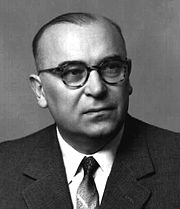
František Šorm
Encyclopedia

Czechoslovak Academy of Sciences
The Czechoslovak Academy of Sciences was established in 1953 to be the scientific center for Czechoslovakia. It was succeeded by the Academy of Sciences of the Czech Republic in 1992.-History:...
.
Šorm studied at the Faculty of Chemistry of the Czech Technical University (later Institute of Chemical Technology
Institute of Chemical Technology in Prague
Institute of Chemical Technology Prague is the largest university specializing in chemistry in the Czech Republic. It was founded in 1952 and since that time it has been one of the leading research spots in Central Europe. More than 2,000 students are accepted every year...
, VŠCHT) absolving the studies in 1936. During the war
World War II
World War II, or the Second World War , was a global conflict lasting from 1939 to 1945, involving most of the world's nations—including all of the great powers—eventually forming two opposing military alliances: the Allies and the Axis...
Šorm worked in a chemical laboratory. After the war he returned to the university and in 1946 was named professor at the VŠCHT. In 1950 Šorm was named professor of organic chemistry
Organic chemistry
Organic chemistry is a subdiscipline within chemistry involving the scientific study of the structure, properties, composition, reactions, and preparation of carbon-based compounds, hydrocarbons, and their derivatives...
at the Charles University in Prague
Charles University in Prague
Charles University in Prague is the oldest and largest university in the Czech Republic. Founded in 1348, it was the first university in Central Europe and is also considered the earliest German university...
.
In 1952 Šorm became the director of the Institute for Organic Chemistry and Biochemistry, part of the newly established Czechoslovak Academy of Sciences
Czechoslovak Academy of Sciences
The Czechoslovak Academy of Sciences was established in 1953 to be the scientific center for Czechoslovakia. It was succeeded by the Academy of Sciences of the Czech Republic in 1992.-History:...
, and General Secretary of the Academy. During 1962-69 he served as the second President of the Academy (after Zdeněk Nejedlý
Zdenek Nejedlý
Zdeněk Nejedlý was a Czech musicologist, music critic, author, and politician whose ideas dominated the cultural life of what is now the Czech Republic for most of the twentieth century...
).
František Šorm was a staunch communist and member of the Central Committee of Communist Party of Czechoslovakia
Communist Party of Czechoslovakia
The Communist Party of Czechoslovakia, in Czech and in Slovak: Komunistická strana Československa was a Communist and Marxist-Leninist political party in Czechoslovakia that existed between 1921 and 1992....
. In his role of a scientist and organizer, however, he considered only the professional capabilities of his coworkers, not their political stance. In 1968 he supported the reform politics of Prague Spring
Prague Spring
The Prague Spring was a period of political liberalization in Czechoslovakia during the era of its domination by the Soviet Union after World War II...
. After the Soviet occupation of Czechoslovakia (which he protested against) Šorm was removed from his administrative positions, was forbidden to attend conferences abroad and was, at age of 60, forced into early retirement. Later he lived in seclusion and died of heart attack.
The institute Šorm founded now awards a medal named after the scientist. A minor planet
Minor planet
An asteroid group or minor-planet group is a population of minor planets that have a share broadly similar orbits. Members are generally unrelated to each other, unlike in an asteroid family, which often results from the break-up of a single asteroid...
(3993 Šorm) was named after him in 1988.
Professional activity
Quoted from http://www.garfield.library.upenn.edu/essays/v15p051y1992-93.pdf: In the field of bioorgamic chemistry, he advanced knowledge of sesquiterpenoids, with medium-ring molecules, and explained the structure of different isoprenoid compounds. He also initiated the study of natural peptides, especially neurohypophyseal hormones and their analogues, some of which were shown to be of major clinical importance. His school of protein chemistry established the primary structure of chymotrypsin and trypsin. While studying the aminoacid sequence in polypeptide chains, Šorm, for the first time, deduced a tentative genetic code. His studies of antimetabolites of nucleic acid constituents as potential cancerostatics or virostatics led to the synthesis and determination of the mechanism of several highly active compounds, for example, 5-azacytidine and 6-azauridine. Finally, he was active in the field of insect juvenile hormones.Šorm was the author or co-author of a large number of scientific publications and patents and was highly cited. He also co-authored several chemistry textbooks. His wife Zora was head of the Department of Biochemistry within the institute.
External links
- Short biography and overview of activities by Antonín HolýAntonín HolýAntonín Holý is a Czech scientist. He specialises in the field of chemistry and cooperated on the development of important antiretroviral drugs used in the treatment of HIV and hepatitis B. He was involved in the creation of the most effective drug in the treatment of AIDS...
(in Czech) - A 1992 essay with biographical information about Šorm

